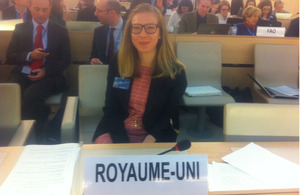Human Rights activity at the Helsinki Embassy
The FCO's Human Rights and Democracy report 2012 has been published. The Helsinki Embassy supported the UN Human Rights Council in its 22nd session.

Sofia Suvila from the Political Section in Geneva
The British Foreign & Commonwealth Office published on 15 April its annual The Human Rights and Democracy Report 2012 highlighting global human rights priorities and looking at concerning human rights situations. The report also reflects on what the FCO has done to address human rights violations. In recent years an increasingly large part of the UK’s human rights work has been carried out in the UN context through the United Nations Human Rights Council. To give an example of what working on human rights issues is like, one of our political team, Sofia Suvila, outlines below her own recent experience at the Human Rights Council.
The experience
The Human Rights Council convened during March for four weeks in Geneva for its 22nd session. This provided me with a great opportunity to swap my job as Political Officer at the British Embassy in Helsinki for that of a member of the UK delegation at the Human Rights Council. Of its three annual sessions, the March one is the longest and most important one, and also the busiest. This is why the permanent Human Rights team of the UK Mission in Geneva welcomed me for two weeks to help out with the workload during the session.
The United Nations Human Rights Council is an intergovernmental body that promotes and protects human rights around the globe. The Council is still a relatively new institution in the UN, having only been established in 2006. All UN member states are represented, but only 47 states are simultaneously members with others acting as observers. The UK was a Council member during 2008-2011 and is currently running again for membership from 2014 for a three-year term.
The work of delegations during the Human Rights Council mainly consists of covering resolutions, promoting national positions, making statements in the plenary and trying to find compromises with other countries. For me personally the most interesting part of my experience in Geneva was to move from the context of bilateral diplomacy that my everyday work consists of, into the context of multilateral negotiations. My main task was to cover a few of the around forty resolutions being negotiated during the session. This meant that I had the chance to follow how negotiations progress from initial informal consultations between delegates to draft texts and finally in the end to tabled resolutions.
An intriguing and also exciting part of being present at the Council was the chance to get a “behind-the-scenes” perspective on these multilateral negotiations. Behind every neatly tabled resolution text, there is a long process of intense discussions between countries, sometimes advocating completely opposing opinions. At times, negotiations can be at a deadlock over a seemingly minor detail in the draft text that however might have great significance for some countries. In the end, most of the difficult questions get resolved, often in the last minute. In the two final days of the Council, all resolutions are discussed and adopted in the plenary, either by consensus or by a majority vote.
A question that one cannot help but ask, after getting to know the mechanisms and inner workings of the Human Rights Council, is about its impact. Does the work that countries carry out at the Council, really make a difference? The UN-system as a whole is often criticised for its inefficiency and, in addition, Human Rights Council resolutions are not legally binding. But after spending two weeks at the Council’s session, I believe that the Council does add value to the promotion of human rights internationally. The fact that a forum such as the Human Rights Council exists, that countries submit themselves voluntarily to peer review and that human rights violations are scrutinized, is already an end in itself. Without international dialogue on human rights, there might be no international awareness, and hence no action on these issues.